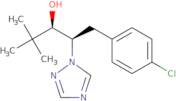Paclobutrazol
CAS: 76738-62-0
Ref. 3D-BDA73862
| 1g | Descontinuado | ||
| 5g | Descontinuado | ||
| 100mg | Descontinuado | ||
| 250mg | Descontinuado | ||
| 500mg | Descontinuado |
Informação sobre produto
- (2-RS,3RS)-1-(4-Chlorophenyl)-4,4-dimethyl-2-(1H-1,2,4-triazol-1-yl)pentan-3-ol
- 1H-1,2,4-Triazole-1-ethanol, β-[(4-chlorophenyl)methyl]-α-(1,1-dimethylethyl)-, (R*,R*)-
- AuStar
- Bonzi
- Bounty Flowable
- Clipper
- Clipper (triazole)
- Cultar
- Duo Xiao Zuo
- Friazole
- Ver mais sinónimos
- Ici-Pp 333
- MET
- Multi-effect triazole
- PP 333 (plant growth regulator)
- Parlay
- Pp 333
- Smarect
- Trimmit
- rel-(αR,βR)-β-[(4-Chlorophenyl)methyl]-α-(1,1-dimethylethyl)-1H-1,2,4-triazole-1-ethanol
- 1H-1,2,4-Triazole-1-ethanol, β-[(4-chlorophenyl)methyl]-α-(1,1-dimethylethyl)-, (αR,βR)-rel-
Paclobutrazol is a chemical that inhibits the growth of bacteria by disrupting photosynthesis. It is used as an analytical method to measure the activity of photosynthetic pigments in plant leaves. Paclobutrazol is also used as a sample preparation method for organic compounds and has been shown to be effective against bacterial strains such as Escherichia coli and Pseudomonas aeruginosa. The LC-MS/MS method has been used to detect paclobutrazol in biological samples such as human urine, serum, plasma, and breast milk samples. Paclobutrazol has also been shown to be carcinogenic when given at high doses.





